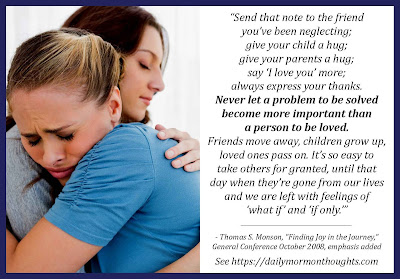"Appreciation for people and events that come into our lives is most important because it is God’s way of helping us to grow. May I say to all of you ... within the sound of my voice, that the ultimate in maturity is being able to feel and express appreciation, being fully aware of value and importance, and showing gratitude for it....
"How does God feel about appreciation? From the Doctrine and Covenants I share this: 'And in nothing doth man offend God, or against none is his wrath kindled, save those who confess not his hand in all things, and obey not his commandments' (D&C 59:21).
"This morning, as indicated, I would like to speak to the first part of that scripture. Would you like to have God’s wrath raised against you? Would you like to have God mad at you? It can come and it will happen if we fail to show appreciation and gratitude. Why does the lack of appreciation offend God and kindle his wrath? Not because he needs to see and hear our appreciation and gratitude, but because he knows an absence of appreciation on the part of anyone causes personal stagnation. Our growth and our progress are delayed when we fail to feel and express appreciation. May we think for a few moments about occasions and situations where we actually say, 'Thank thee, God, for people and events that have come into our lives that have made it possible for us to develop and grow and mature, for all people, for all conditions, and for all circumstances when we are allowed to appreciate human beings and situations for what they can do and will mean to us.'...
"How do we show appreciation for God’s great gifts? How do we show appreciation for the gifts of parents, companions, roommates, those that we are with constantly? How do we do it? By our lives, by our works, and by our words, and through a willingness to confess his hand in this and in all other great gifts....
"May I conclude by saying, 'When thou risest in the morning let thy heart be full of thanks unto God' (Alma 37:37). This is a choice, all-inclusive quotation from Alma."
- Marvin J. Ashton, "Appreciation—Sign of Maturity," BYU devotional, April 13, 1976
Click here to read or listen to the full talk
"Appreciation... is God’s way of helping us to grow." That's a great statement! We more commonly think that we grow through trials, or through learning, or through service. Elder Ashton claims that the truly grateful heart is one that is progressing and developing. And that "the ultimate in maturity" is the ability to "feel and express appreciation."
The Doctrine and Covenants passage that tells how ingratitude offends and angers God puzzled me for a long time. It seemed to say, as Elder Ashton suggests, that God needs our praise and recognition for His own personal reasons. But instead, I think that He knows how much we need to express those feelings for our benefit, not His. "Our growth and our progress are delayed when we fail to feel and express appreciation."
So it's the process of showing appreciation, along with expressing it, that is key. We do, indeed, want to have our hearts "full of thanks unto God" at all times; we will demonstrate that gratitude "By our lives, by our works, and by our words, and through a willingness to confess his hand in this and in all other great gifts."
(Compilation and commentary by David Kenison, Orem, Utah, 2021)
November 21, 2017
November 21, 2017



















